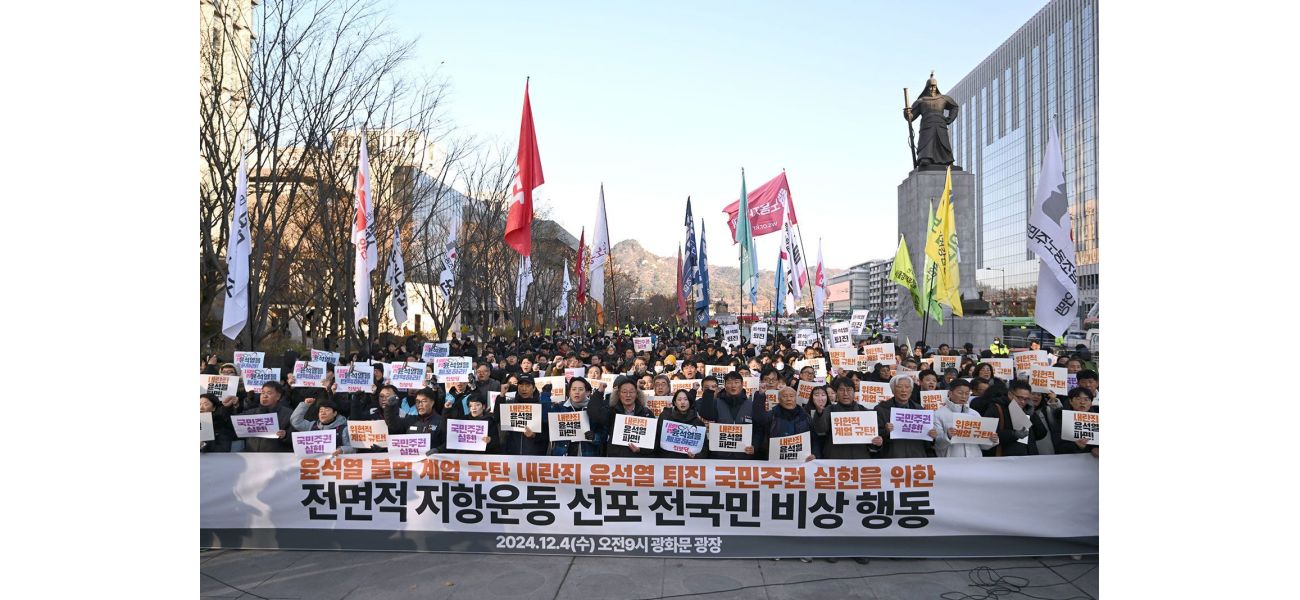South Korea faces an uncertain future. What's next for the country?
In a chaotic turn of events, South Korea's president declared martial law, but later revoked it due to backlash, causing political turmoil.
December 4th 2024.

The people of South Korea were left in a state of shock and confusion after a dramatic turn of events. The country's president, Yoon Suk Yeol, had declared martial law in a late-night televised address, accusing the opposition party of sympathizing with North Korea and engaging in "anti-state" activities. This unexpected move sent shock waves through the nation, which has a strong tradition of free speech and democratic values.
As most South Koreans were preparing to go to bed, lawmakers were forced to take action against the decree. In a dramatic show of defiance, they stormed into parliament and voted unanimously to strike it down. This was a bold move, considering that the president had the constitutional authority to declare martial law in times of emergency. However, the lawmakers were determined to uphold democracy and protect the rights of the people.
The martial law decree had banned all political activities, including protests, rallies, and actions by political parties. It also prohibited any attempts to subvert the government or manipulate public opinion. This caused outrage among the people, who saw it as a threat to their freedom and democratic values.
Thankfully, the lawmakers' actions proved to be effective as the president was forced to lift the martial law order in the early hours of the morning. He announced that the troops that were deployed to enforce the decree had been withdrawn. However, he still stood by his accusations against the opposition party and urged them to stop obstructing his government's efforts.
This move by the president has thrown the country's political landscape into chaos and uncertainty. The future of Yoon's presidency, his party's rule, and the country's economy are all in question. This has caused concern not just within the country but also among its allies.
South Korea has been in a state of political paralysis for months, with the opposition party winning a majority in parliament in April. This has hindered the president's ability to implement his policies and fulfill his campaign promises. The opposition has also been making efforts to impeach government figures, which has only added to the political tension in the country.
The response to the martial law decree was one of outrage and condemnation from both within the country and around the world. People were alarmed by the sudden turn of events and the threat it posed to their democratic values. The world was watching as South Korea grappled with this political crisis, unsure of what would happen next. The country's future hangs in the balance as the people wait to see how this situation will unfold.
South Korea is in a state of chaos and uncertainty after a tumultuous eight hours that saw the country's president, Yoon Suk Yeol, declare martial law and then quickly rescind it amidst widespread backlash. The events began unfolding late last night, with furious lawmakers storming into parliament to oppose the president's decree while protesters demanded Yoon's removal and a rejection of the country's authoritarian past.
The situation was tense and uncertain, with questions swirling about the future of Yoon's presidency, his party's rule, and the implications for one of the world's most important economies and a major Western ally. Here's what we know so far.
It all started when Yoon made a surprise announcement on television at 10:30pm local time, declaring martial law and accusing the country's main opposition party of anti-state activities and sympathizing with North Korea. He also cited a motion by the opposition Democratic Party to impeach top prosecutors and reject a government budget proposal as reasons for his decision. Martial law refers to the temporary rule of the military during a state of emergency, which the president has the power to declare.
The announcement sent shockwaves throughout the country, as South Korea has a strong tradition of free speech and democratic values. Yoon's decree banned all political activities, including protests and rallies, and also prohibited the manipulation of public opinion. However, this decree only lasted a few hours as lawmakers quickly gathered in an emergency late-night meeting to unanimously vote against it. The president is legally bound to obey this vote, leading him to announce that he would comply and lift the martial law order.
The country's political parties, including members of Yoon's own party, came together to oppose the decree and demand an explanation from the president. By 4:30am, Yoon had withdrawn the troops deployed earlier in the night and his cabinet voted to lift the decree soon after. However, the president continued to accuse the opposition party of obstructing his government's efforts and urged lawmakers to stop their "legislative manipulation".
This incident highlights the political paralysis that has gripped South Korea for months, with the liberal opposition parties winning a majority in parliament in April. This election was seen as a referendum on Yoon's presidency, which has been plagued by scandals and controversies since he took office in 2022. The president's popularity has plummeted, and he has been unable to push forward on his campaign promises to cut taxes and ease business regulations due to clashes with the opposition.
One of the main points of contention between Yoon and the opposition has been the latter's efforts to impeach government officials, some of whom were appointed by the president himself. This includes the chair of the broadcasting watchdog, the chair of the state auditor, and several top prosecutors. Yoon has been particularly frustrated with the opposition's attempts to impeach these prosecutors, who have failed to indict his wife on accusations of stock manipulation.
The response to these events has been one of outrage, shock, and confusion both within South Korea and around the world. The country's political landscape has been thrown into chaos, and the future remains uncertain. This incident serves as a reminder of the fragility of democracy and the importance of upholding democratic values in the face of authoritarian tendencies.
As most South Koreans were preparing to go to bed, lawmakers were forced to take action against the decree. In a dramatic show of defiance, they stormed into parliament and voted unanimously to strike it down. This was a bold move, considering that the president had the constitutional authority to declare martial law in times of emergency. However, the lawmakers were determined to uphold democracy and protect the rights of the people.
The martial law decree had banned all political activities, including protests, rallies, and actions by political parties. It also prohibited any attempts to subvert the government or manipulate public opinion. This caused outrage among the people, who saw it as a threat to their freedom and democratic values.
Thankfully, the lawmakers' actions proved to be effective as the president was forced to lift the martial law order in the early hours of the morning. He announced that the troops that were deployed to enforce the decree had been withdrawn. However, he still stood by his accusations against the opposition party and urged them to stop obstructing his government's efforts.
This move by the president has thrown the country's political landscape into chaos and uncertainty. The future of Yoon's presidency, his party's rule, and the country's economy are all in question. This has caused concern not just within the country but also among its allies.
South Korea has been in a state of political paralysis for months, with the opposition party winning a majority in parliament in April. This has hindered the president's ability to implement his policies and fulfill his campaign promises. The opposition has also been making efforts to impeach government figures, which has only added to the political tension in the country.
The response to the martial law decree was one of outrage and condemnation from both within the country and around the world. People were alarmed by the sudden turn of events and the threat it posed to their democratic values. The world was watching as South Korea grappled with this political crisis, unsure of what would happen next. The country's future hangs in the balance as the people wait to see how this situation will unfold.
South Korea is in a state of chaos and uncertainty after a tumultuous eight hours that saw the country's president, Yoon Suk Yeol, declare martial law and then quickly rescind it amidst widespread backlash. The events began unfolding late last night, with furious lawmakers storming into parliament to oppose the president's decree while protesters demanded Yoon's removal and a rejection of the country's authoritarian past.
The situation was tense and uncertain, with questions swirling about the future of Yoon's presidency, his party's rule, and the implications for one of the world's most important economies and a major Western ally. Here's what we know so far.
It all started when Yoon made a surprise announcement on television at 10:30pm local time, declaring martial law and accusing the country's main opposition party of anti-state activities and sympathizing with North Korea. He also cited a motion by the opposition Democratic Party to impeach top prosecutors and reject a government budget proposal as reasons for his decision. Martial law refers to the temporary rule of the military during a state of emergency, which the president has the power to declare.
The announcement sent shockwaves throughout the country, as South Korea has a strong tradition of free speech and democratic values. Yoon's decree banned all political activities, including protests and rallies, and also prohibited the manipulation of public opinion. However, this decree only lasted a few hours as lawmakers quickly gathered in an emergency late-night meeting to unanimously vote against it. The president is legally bound to obey this vote, leading him to announce that he would comply and lift the martial law order.
The country's political parties, including members of Yoon's own party, came together to oppose the decree and demand an explanation from the president. By 4:30am, Yoon had withdrawn the troops deployed earlier in the night and his cabinet voted to lift the decree soon after. However, the president continued to accuse the opposition party of obstructing his government's efforts and urged lawmakers to stop their "legislative manipulation".
This incident highlights the political paralysis that has gripped South Korea for months, with the liberal opposition parties winning a majority in parliament in April. This election was seen as a referendum on Yoon's presidency, which has been plagued by scandals and controversies since he took office in 2022. The president's popularity has plummeted, and he has been unable to push forward on his campaign promises to cut taxes and ease business regulations due to clashes with the opposition.
One of the main points of contention between Yoon and the opposition has been the latter's efforts to impeach government officials, some of whom were appointed by the president himself. This includes the chair of the broadcasting watchdog, the chair of the state auditor, and several top prosecutors. Yoon has been particularly frustrated with the opposition's attempts to impeach these prosecutors, who have failed to indict his wife on accusations of stock manipulation.
The response to these events has been one of outrage, shock, and confusion both within South Korea and around the world. The country's political landscape has been thrown into chaos, and the future remains uncertain. This incident serves as a reminder of the fragility of democracy and the importance of upholding democratic values in the face of authoritarian tendencies.
[This article has been trending online recently and has been generated with AI. Your feed is customized.]
[Generative AI is experimental.]
0
0
Submit Comment





